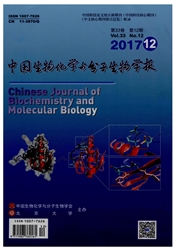

 中文摘要:
中文摘要:
为了阐明Wnt/β-catenin信号通路在猪骨骼肌卫星细胞增殖分化中的作用,利用Wnt/β-catenin信号通路抑制剂(-)-表没食子儿茶素没食子酸酯(EGCG)处理猪骨骼肌卫星细胞,采用MTT、流式细胞术、免疫荧光和Western印迹等方法检测了细胞增殖和分化情况.结果显示,与对照组相比,EGCG以时间、浓度依赖方式抑制猪骨骼肌卫星细胞的增殖.流式细胞术检测细胞周期结果表明,与对照组相比,经EGCG处理后,猪骨骼肌卫星细胞的G1期细胞比例上升,而G2和S期细胞比例下降,这说明细胞被阻滞在G1期,细胞的增殖受到抑制.免疫荧光检测分化过程中MyHC的表达,与对照组相比,EGCG促进猪骨骼肌卫星细胞的分化,并降低增殖标志基因MyoD以及细胞周期蛋白D的表达量,而提高了分化标志基因MyoG和MyHC的表达量.在猪骨骼肌卫星细胞增殖分化过程中,EGCG降低β-联蛋白的表达量,且核内的β-联蛋白明显减少.结果表明,EGCG通过抑制Wnt/β-catenin信号通路抑制猪骨骼肌卫星细胞的增殖,促进其分化.
 英文摘要:
英文摘要:
To clarify the role of Wnt/β-catenin signaling pathway in proliferation and differentiation of porcine skeletal muscle satellite cells,the Wnt/β-catenin signaling pathway inhibitor(-)-epigallocatechin-3-gallate(EGCG) was used to treat skeletal muscle satellite cells.Then the proliferation and differentiation of satellite cells were analyzed with MTT,flow cytometry,immunofluorescence and Western blotting.The results showed that EGCG inhibited proliferation in porcine skeletal muscle satellite cells by a time-and dose-dependent manners.Flow cytometry analyses of cell cycle revealed that the percentage of cells in G1 phase was increased but G2 and S phases decreased after EGCG treatment.This suggested that the cells were blocked in the G1 phase.EGCG promoted the differentiation in skeletal muscle satellite cells and MyHC expression during differentiation using immunofluorescence staining.In contrast,EGCG reduced the expression of cyclin D1 and MyoD,which was a marker for skeletal muscle proliferation,but increased the expression of MyHC and MyoG which were markers for skeletal muscle differentiation.In proliferation and differentiation processes of skeletal muscle satellite cells,EGCG reduced the expression of β-catenin as well as β-catenin translocation.These results demonstrated that Wnt/β-catenin signaling pathway inhibited by EGCG suppressed the proliferation of porcine skeletal muscle satellite cells and promoted their differentiation.
 同期刊论文项目
同期刊论文项目
 同项目期刊论文
同项目期刊论文
 β-catenin protein utilized by Tumour necrosis factor-α in porcine preadipocytes to suppress differen
β-catenin protein utilized by Tumour necrosis factor-α in porcine preadipocytes to suppress differen 期刊信息
期刊信息
